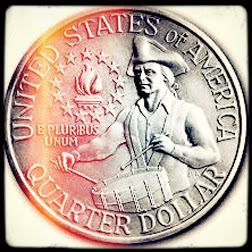Never mind all those social media and marketing tactics that everyone wants you to remember. The life span of most online marketing tactics lasts about six months if you are lucky. Sure, some last a little longer. Some last a little less. But all of them change.
The future of the Internet is poised to leap well ahead of wearable technology that quantifies the self. It's one of the reasons I both praised and dismissed some of the tips featured in 99 Facts Every Entrepreneur Must Be Aware Of In The Digital Age. Most of those tips will last only a blink.
Ergo. Some people predict 90 percent of all Internet traffic will be video by 2017. I doubt it. It will much more likely be interactive mixed medium and augmented reality interface. Some of the other presentation facts are much more valuable because they monitor the past as opposed to predicting the future.
In fact, some of the most powerful slides from that presentation demonstrate just how powerful change can be. More than 40 percent of Fortune 500 companies in 2000 disappeared by 2010.
The future is flexible. It can be as bright or as dark as we make it.
The first part of this post — The Future Of The Everywherenet, Part 1 — expressed some of the brilliant innovations we'll see in the near future. This one touches on something else all together.
Anytime I present On Spreading Messages as part of my Writing For Public Relations series, I point out one ugly truth about communication. For every innovation that propels us forward, someone inevitably invents a manipulation that drags us backward. The same can be said about technology.
As Geoff Livingston reported from SXSW, some of the biggest buzz centered on the surveillance. He suggested that keynotes Julian Assange and Edward Snowden set the tone. Maybe. Maybe not.
I see it as a sign of the times because some of the greatest innovations ahead come with some of the greatest potential for abuse. It's part of an older conversation that often gets shuffled away into the shadows because it creeps people out. Why? The downside of an everywherenet is the inability to escape it.
Concepts like proximity advertising, consumer profiling, and big data collection are not new, but we tend to ignore them (except when we actively embrace them without wisdom). People frequently tell me that privacy concerns are merely a topic for conspiracy theorists, but conversations that I've had about the future of an everywherenet point to surveillance as a side effect of something better.
In other words, nobody will willingly agree to everything they do being captured, quantified, and assessed. But when you package it as a benefit, everyone wants to sign up. Privacy always seems optional.
Technology is an excellent servant and a relentless master.
Case in point. My doctor smiled when he said he couldn't wait for the day that I would walk into his office, step in front of a display, and immediately see a complete diagnostic. While working in energy medical services, first responders were among the biggest advocates of transportation computer chips that pinpoint location and provide damage assessments at the scene of any accident. Some technology futurists I know frequently fantasize about a world where you can wave a hand in front of a cash register to make a purchase or unlock your front door without a key. The benefit would be convenience, crime abatement, and (given the option) consumer discounts and rebates.
All of those benefits sound too good to be true, but none of them are free. The price is a complete and total erosion of privacy. And once privacy is given up freely, analysis is only a few key strokes away.
One day, your doctor could be required to submit your health information to a federally-monitored health care system with consensus-approved procedures to help you modify your health. One day, your vehicle might not only be better equipped to assist you but also better equipped to ensure compliance with all local, state, and federal laws. One day, all of your data could be confined to a single processor either embedded in your body or a federal or state issued identification card that must be carried at all times.
Some thought leaders in the technology sector look at these solutions as being vital to what they call the technological evolution of mankind — where our biological circuitry can freely interact with the Internet. And in some thought exercises, they imagine a world where working for the good of society is a foregone conclusion and the pursuit of individual luxuries (what some might call happiness) is old hat.
Think it's all science fiction? Some of it has already been done. What hasn't will be old news by 2020.
But what does this have to with marketing and public relations? Maybe nothing. Maybe everything. Personally, I think communicators need to be more than cheerleaders for their organizations. They need to service both the interests of the organization and the public. And by that, I don't mean what needs to be done for their own good. The question always needs to be: If not you, then who?
The future of the Internet is poised to leap well ahead of wearable technology that quantifies the self. It's one of the reasons I both praised and dismissed some of the tips featured in 99 Facts Every Entrepreneur Must Be Aware Of In The Digital Age. Most of those tips will last only a blink.
Ergo. Some people predict 90 percent of all Internet traffic will be video by 2017. I doubt it. It will much more likely be interactive mixed medium and augmented reality interface. Some of the other presentation facts are much more valuable because they monitor the past as opposed to predicting the future.
In fact, some of the most powerful slides from that presentation demonstrate just how powerful change can be. More than 40 percent of Fortune 500 companies in 2000 disappeared by 2010.
The future is flexible. It can be as bright or as dark as we make it.
The first part of this post — The Future Of The Everywherenet, Part 1 — expressed some of the brilliant innovations we'll see in the near future. This one touches on something else all together.
Anytime I present On Spreading Messages as part of my Writing For Public Relations series, I point out one ugly truth about communication. For every innovation that propels us forward, someone inevitably invents a manipulation that drags us backward. The same can be said about technology.
As Geoff Livingston reported from SXSW, some of the biggest buzz centered on the surveillance. He suggested that keynotes Julian Assange and Edward Snowden set the tone. Maybe. Maybe not.
I see it as a sign of the times because some of the greatest innovations ahead come with some of the greatest potential for abuse. It's part of an older conversation that often gets shuffled away into the shadows because it creeps people out. Why? The downside of an everywherenet is the inability to escape it.
Concepts like proximity advertising, consumer profiling, and big data collection are not new, but we tend to ignore them (except when we actively embrace them without wisdom). People frequently tell me that privacy concerns are merely a topic for conspiracy theorists, but conversations that I've had about the future of an everywherenet point to surveillance as a side effect of something better.
In other words, nobody will willingly agree to everything they do being captured, quantified, and assessed. But when you package it as a benefit, everyone wants to sign up. Privacy always seems optional.
Technology is an excellent servant and a relentless master.
Case in point. My doctor smiled when he said he couldn't wait for the day that I would walk into his office, step in front of a display, and immediately see a complete diagnostic. While working in energy medical services, first responders were among the biggest advocates of transportation computer chips that pinpoint location and provide damage assessments at the scene of any accident. Some technology futurists I know frequently fantasize about a world where you can wave a hand in front of a cash register to make a purchase or unlock your front door without a key. The benefit would be convenience, crime abatement, and (given the option) consumer discounts and rebates.
All of those benefits sound too good to be true, but none of them are free. The price is a complete and total erosion of privacy. And once privacy is given up freely, analysis is only a few key strokes away.
One day, your doctor could be required to submit your health information to a federally-monitored health care system with consensus-approved procedures to help you modify your health. One day, your vehicle might not only be better equipped to assist you but also better equipped to ensure compliance with all local, state, and federal laws. One day, all of your data could be confined to a single processor either embedded in your body or a federal or state issued identification card that must be carried at all times.
Some thought leaders in the technology sector look at these solutions as being vital to what they call the technological evolution of mankind — where our biological circuitry can freely interact with the Internet. And in some thought exercises, they imagine a world where working for the good of society is a foregone conclusion and the pursuit of individual luxuries (what some might call happiness) is old hat.
Think it's all science fiction? Some of it has already been done. What hasn't will be old news by 2020.
But what does this have to with marketing and public relations? Maybe nothing. Maybe everything. Personally, I think communicators need to be more than cheerleaders for their organizations. They need to service both the interests of the organization and the public. And by that, I don't mean what needs to be done for their own good. The question always needs to be: If not you, then who?










































